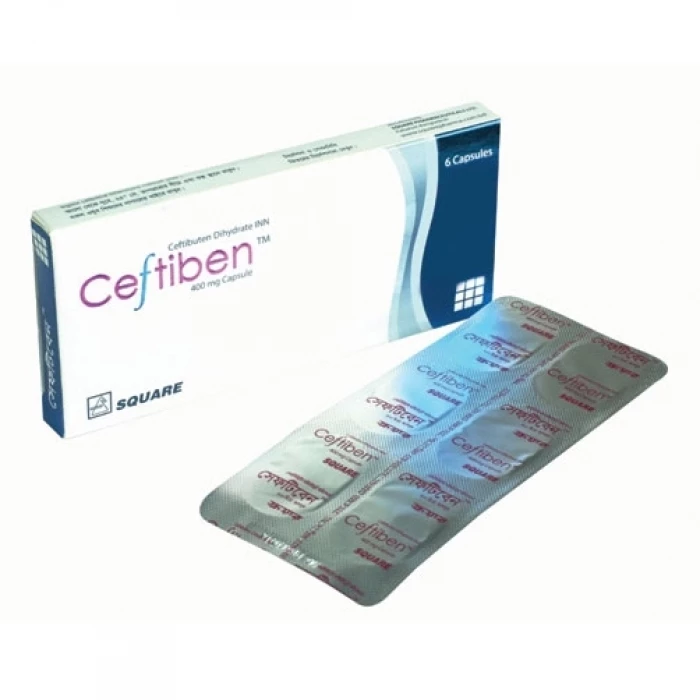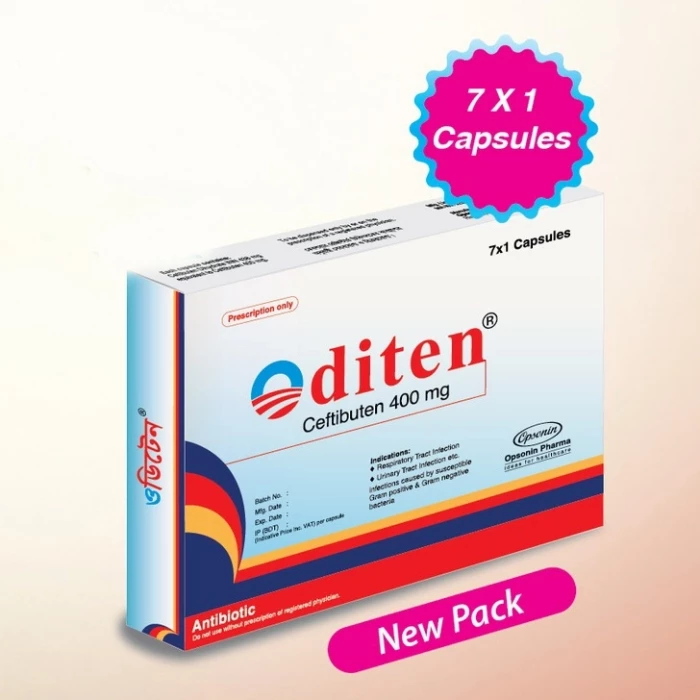
✔ 100% Authentic Product
👁️ Currently Viewing 1842
Ceftibuten is a broad-spectrum antibiotic used to treat certain infections of the lungs, urinary tract, throat, tonsils, ears, etc. caused by susceptible bacteria.
Discount
Price: ৳ 823
MRP:
৳
840
2%
Off

100% Genuine Products, Guaranteed

Safe & Secure Payments, Always

Fast, Secure & Efficient Delivery

Proper Packaging
 Cash on Delivery - All over Bangladesh
Cash on Delivery - All over Bangladesh Regular Delivery - 12-24 Hours, Dhaka City* Charge Tk.39-59
Regular Delivery - 12-24 Hours, Dhaka City* Charge Tk.39-59 Regular Delivery - 24-48 Hours, Other Cities* Charge Tk.99-110
Regular Delivery - 24-48 Hours, Other Cities* Charge Tk.99-110
 ফ্রি ডেলিভারিঃ - ৯৯৯ টাকা+ অর্ডারে, ঢাকা
শহরে
ফ্রি ডেলিভারিঃ - ৯৯৯ টাকা+ অর্ডারে, ঢাকা
শহরে ফ্রি ডেলিভারিঃ - ২৯৯৯ টাকা+ অর্ডারে, ঢাকার
বাহিরে
ফ্রি ডেলিভারিঃ - ২৯৯৯ টাকা+ অর্ডারে, ঢাকার
বাহিরে
100% Genuine Products, Guaranteed
Safe & Secure Payments, Always
Fast, Secure & Efficient Delivery
Proper Packaging
 Cash on Delivery - All over Bangladesh
Cash on Delivery - All over Bangladesh Regular Delivery - 12-24 Hours, Dhaka City* Charge Tk.39-59
Regular Delivery - 12-24 Hours, Dhaka City* Charge Tk.39-59 Regular Delivery - 24-48 Hours, Other Cities* Charge Tk.99-110
Regular Delivery - 24-48 Hours, Other Cities* Charge Tk.99-110 ফ্রি ডেলিভারিঃ - ৯৯৯ টাকা+ অর্ডারে, ঢাকা
শহরে
ফ্রি ডেলিভারিঃ - ৯৯৯ টাকা+ অর্ডারে, ঢাকা
শহরে ফ্রি ডেলিভারিঃ - ২৯৯৯ টাকা+ অর্ডারে, ঢাকার
বাহিরে
ফ্রি ডেলিভারিঃ - ২৯৯৯ টাকা+ অর্ডারে, ঢাকার
বাহিরে
✅ Description:
Cebuten 400mg Capsule is prescribed for bacterial infections affecting various parts of the body, including the lungs (such as pneumonia), urinary tract, ear, nasal sinuses, and throat.
Cebuten 400mg Capsule is an antibiotic that works by killing bacteria responsible for the infection. It inhibits the growth and multiplication of bacteria by interfering with their cell wall synthesis, ultimately leading to their death.
- Administer Cebuten 400mg Capsule with or without food.
- Take it regularly at evenly spaced intervals as prescribed by your doctor.
- Complete the full course of treatment, even if you feel better, to prevent the recurrence of infection.
- Inform your doctor about any allergies to antibiotics, kidney problems, or liver issues before using Procadax 90mg Syrup.
- Pregnant and breastfeeding women should consult their doctor before taking this medication.
Cebuten 400mg Capsule is not effective against viral infections like the flu or common cold. Misuse or overuse of antibiotics may decrease their effectiveness against future infections.
Safety Advices

Alcohol
UNSAFE
Consuming alcohol with Ceftiben does not cause harmful side effects.

Pregnancy
CONSULT YOUR DOCTOR
Ceftiben is generally considered safe to use during pregnancy. Limited human studies suggest low risk, but caution is advised.

Breastfeeding
CONSULT YOUR DOCTOR
Ceftiben should be used with caution during breastfeeding. Consider holding breastfeeding until the drug is eliminated from the mother's body.

Driving
SAFE
Ceftiben does not usually affect your ability to drive.

Kidney
CONSULT YOUR DOCTOR
Ceftiben should be used cautiously in patients with kidney disease. Dose adjustment may be necessary. Consult your doctor for guidance.

Liver
CONSULT YOUR DOCTOR
Limited information is available on the use of Ceftiben in patients with liver disease. Consult your doctor for advice and monitoring.
✔️ Uses of Cebuten 400mg Capsule
- Otitis media
- Tonsilitis/Pharyngitis
- Bronchitis
- Cystitis
- Pneumonia
- Sinusitis
✔️ How does Cebuten 400mg Capsule work?
Cebuten works by interfering with certain processes that help the bacteria to grow and increase in number.
✔️ Side Effects of Cebuten 400mg Capsule
- Nausea
- Headache
- Diarrhea
- Dizziness
- Vomiting
- Abdominal pain
- Indigestion
✔️ Quick Suggestions:
- Your doctor has prescribed Cebuten 400mg Capsule to cure your infection and improve your symptoms.
- Take it with food to avoid an upset stomach.
- Do not skip any doses and finish the full course of treatment even if you feel better. Stopping it early may make the infection harder to treat.
- Discontinue Cebuten 400mg Capsule and inform your doctor immediately if you get a rash, itchy skin, swelling of your face and mouth, or difficulty breathing.
- Diarrhea may occur as a side effect but should stop when your course is complete. Inform your doctor if it does not stop or if you find blood in your stools.
✔️ Indication of Cebuten 400mg Capsule
Cebuten is indicated for the treatment of individuals with mild-to-moderate infections caused by susceptible strains of the designated microorganisms in the specific conditions listed below:
Acute Bacterial Exacerbations of Chronic Bronchitis: This includes infections caused by Haemophilus influenzae (including β-lactamase producing strains), Moraxella catarrhalis (including β-lactamase producing strains), or Streptococcus pneumoniae (penicillin-susceptible strains only).
Acute Bacterial Otitis Media: This covers infections caused by Haemophilus influenzae (including β-lactamase producing strains), Moraxella catarrhalis (including β-lactamase producing strains), or Streptococcus pyogenes.
Pharyngitis and Tonsillitis: This is indicated for infections caused by Streptococcus pyogenes.
✔️ Pharmacology
Ceftibuten is a semi-synthetic cephalosporin antibiotic intended for oral administration. It is the dihydrate salt form of Ceftibuten. This antibiotic exerts its bactericidal action by binding to essential target proteins present in the bacterial cell wall. This binding process ultimately inhibits the synthesis of the cell wall, leading to the destruction of the bacterial cells.
✔️ Dosage & Administration of Cebuten 400mg Capsule
Adult Dose:
- Oral Respiratory tract infections, Urinary tract infections: 400 mg once daily for 10 days.
Child Dose:
- Children 6-12 years old or <45 kg: 9 mg/kg orally once daily; maximum dose of 400 mg/day orally for 10 days.
- Children >12 years old or >45 kg: Same as adult dose.
Renal Dose:
- For patients with renal impairment:
- Creatinine clearance (CrCl) 30-49 ml/min: 200 mg once daily.
- Creatinine clearance (CrCl) 5-29 ml/min: 100 mg once daily.
Ceftibuten may be taken with or without food.
✔️ Interaction
Enhanced nephrotoxicity with aminoglycosides: Concurrent use of Ceftibuten with aminoglycoside antibiotics may increase the risk of nephrotoxicity, which is kidney damage. This combination should be used with caution, and renal function should be monitored closely.
Increased serum concentration with probenecid: Probenecid, a medication used to treat gout, can increase the serum concentration of Ceftibuten. This interaction may lead to higher levels of Ceftibuten in the blood, potentially increasing the risk of adverse effects. Monitoring for Ceftibuten-related side effects is advisable when these medications are used together.
Decreased serum concentration with zinc salts: Zinc salts, often used as supplements, may decrease the serum concentration of Ceftibuten. This interaction could potentially reduce the effectiveness of Ceftibuten in treating infections. It is advisable to avoid concurrent use of Ceftibuten with zinc salts unless directed by a healthcare professional.
✔️ Contraindications
Ceftibuten is contraindicated in patients with known allergies to the cephalosporin group of antibiotics.
✔️ Pregnancy & Lactation
Pregnancy Category B. There are no controlled data on the use of Ceftibuten in pregnant women. Ceftibuten should be used in pregnancy only when the benefit outweighs the risk. It is not known whether Ceftibuten (recommended dosage) is excreted in human milk. Because many drugs are excreted in human milk, caution should be exercised when Ceftibuten is administered to nursing women.
✔️ Precautions & Warnings
- Hypersensitivity to penicillins
- Renal impairment
- Porphyria
- Monitor renal and haematologic status
- Lactation: excretion in milk unknown; use with caution
✔️ Storage Conditions:
Store below 30°C
⚠️Disclaimer:
At ePharma, we’re committed to providing accurate and accessible health information. However, all content is intended for informational purposes only and should not replace medical advice from a qualified physician. Please consult your healthcare provider for personalized guidance. We aim to support, not substitute, the doctor-patient relationship.








